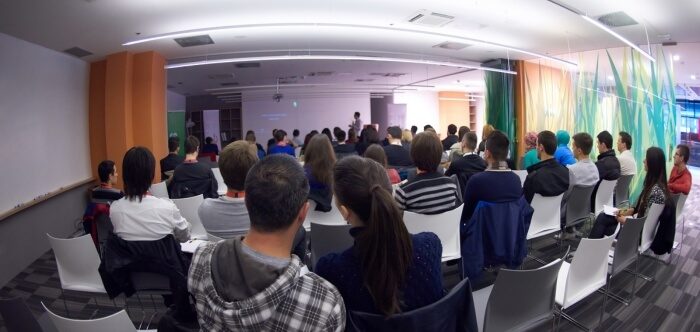Attending a conference in Canada offers a unique blend of professional growth and cultural exploration. However, travelers often wonder, “Can I join a conference in Canada with a US visa?”
No you can’t. While a US visa allows entry into the United States, it does not grant access to Canada. For conference attendance in Canada, you will need a Temporary Resident Visa (TRV), an Electronic Travel Authorization (eTA), or a work visa, depending on your specific circumstances.
This requirement highlights the importance of understanding international travel regulations. To navigate this process smoothly and ensure you have the correct documentation for your trip, continue reading our comprehensive guide, which provides detailed insights and tips for a hassle-free experience.
A Brief Overview of Canadian Conferences
Canada’s conference landscape is as diverse as its geography. From bustling urban centers to serene natural settings, these events cater to a wide array of interests and industries. The country’s commitment to innovation and multiculturalism is often reflected in the themes and discussions at these gatherings.

Major Canadian cities like Toronto, Montreal, and Vancouver regularly host international conferences, drawing experts and enthusiasts from various fields. These events not only foster professional networking but also showcase Canada’s advancements in technology, healthcare, and environmental sustainability. Attendees experience a blend of cutting-edge insights and cultural richness, unique to Canada’s vibrant conference scene.
Can I Join a Conference in Canada With a US Visa?
No, a US visa does not permit entry into Canada for conference participation. Different entry requirements apply for traveling to Canada, even for short durations like attending a conference.
Visa Requirements for Canada
Canada requires a Temporary Resident Visa (TRV), Electronic Travel Authorization (eTA), or a work visa for entry. This depends on your nationality, purpose of visit, and length of stay. Careful planning is essential to determine the appropriate visa type for your needs.
US Visa Limitations
A US visa strictly allows entry into the United States. It does not extend privileges to Canada or other countries. Understanding these limitations is crucial to avoid travel complications.
Conference-Specific Regulations
Some conferences may have specific entry requirements based on their nature or location. It’s important to check with the event organizers. Additionally, consult Canadian immigration policies for any updates or special provisions for conference attendees.
Preparation and Documentation
Preparing the correct documentation is key for a smooth travel experience. This includes a valid passport, visa application, and sometimes an invitation letter from the conference. Ensure all documents are up to date and submitted well in advance of your travel dates.
Understanding eTA Eligibility
Travelers from certain countries may be eligible for an Electronic Travel Authorization (eTA) instead of a visa. An eTA is easier to obtain and is electronically linked to your passport. However, it’s important to verify your eligibility for an eTA based on your nationality.
Navigating Work Visa Scenarios
If your conference participation involves remunerated activities, a work visa might be necessary. This includes activities like giving a talk or conducting a workshop. Each situation is unique, so consult with Canadian immigration or a legal expert if unsure.
By understanding and adhering to these factors, you can ensure a compliant and hassle-free experience when planning to attend a conference in Canada.
Types of Conferences in Canada You Can Attend
Canada’s conference scene is as varied and dynamic as the country itself. These events range from academic symposiums to industry-specific expos, attracting global participants. Each type offers unique opportunities for learning, networking, and collaboration.
Academic and Research Conferences
Academic conferences in Canada focus on scholarly research and advancements in various fields. These gatherings often feature presentations from leading academics and researchers. They’re ideal for students, educators, and professionals seeking the latest in academic developments. Networking opportunities with peers and experts are a significant draw.
Industry-Specific Trade Shows
Trade shows in Canada cater to specific industries, from technology to healthcare. These events showcase the latest products, services, and innovations within the industry. Attendees include professionals, entrepreneurs, and buyers looking to network and explore new market trends. These shows are pivotal for business development and industry insights.
Cultural and Creative Festivals
Cultural festivals celebrate Canada’s diverse artistic and cultural heritage. These events feature a blend of music, art, film, and literature. They attract artists, creatives, and cultural enthusiasts from around the world. Such festivals foster cultural exchange and artistic collaborations.
Technology and Innovation Summits
Technology summits in Canada are hotbeds for the latest tech trends and innovations. These events attract startups, tech giants, and investors. Discussions revolve around emerging technologies, digital transformation, and future trends. Networking opportunities with industry leaders are abundant.
Whether you’re an academic, industry professional, creative, or tech enthusiast, Canada’s diverse range of conferences has something to offer. Each type provides a unique platform for growth, learning, and connection in your respective field. Attendees leave enriched and inspired, carrying with them new insights and connections.
Considerations While Travelling to Another Country for a Conference
Traveling to another country for a conference requires careful planning and awareness of various aspects. It’s not just about the event itself, but also ensuring a smooth and hassle-free journey. Here are some key considerations to keep in mind:
- Visa and Entry Requirements: Determine if you need a visa or other entry permits for your destination. Research and apply well in advance to avoid last-minute hassles.
- Health and Vaccinations: Check health advisories and vaccination requirements for the country you’re visiting. Ensure you’re up-to-date with recommended vaccinations and health precautions.
- Travel Insurance: Secure comprehensive travel insurance covering medical emergencies, trip cancellations, and lost luggage. It’s crucial for unexpected situations and peace of mind.
- Cultural Sensitivity: Familiarize yourself with local customs, etiquette, and cultural norms. Being culturally sensitive can enhance your experience and interactions with locals.
- Communication and Connectivity: Plan for communication needs, like an international SIM card or roaming plans. Staying connected and keeping in touch is vital for emergencies.
- Financial Preparation: Understand the currency and banking system of the host country. Carry a mix of cash and cards, and inform your bank of travel plans.
- Accommodation and Transportation: Book accommodations and local transport in advance. Research locations close to the conference venue for convenience.
- Emergency Contacts and Safety: Keep a list of emergency contacts, including your country’s embassy or consulate. Be aware of safety guidelines and local emergency services.
In summary, attending a conference abroad is an enriching experience that requires thorough preparation. From understanding visa requirements to being culturally aware, each aspect is crucial in ensuring a successful and enjoyable trip. Remember these considerations to make the most of your international conference journey.
Benefits of Attending a Conference in Abroad Country
Attending a conference in a foreign country is not just an academic or professional endeavor; it’s an adventure that enriches on multiple fronts. From expanding your network to experiencing new cultures, the benefits are vast and varied. Let’s explore the key advantages of attending an international conference.
Global Networking Opportunities
Attending an international conference opens doors to a global network of professionals and experts. You meet individuals from diverse backgrounds, offering a chance to form lasting professional relationships. These connections can lead to collaborative projects or opportunities in different countries. Networking at such a scale is invaluable for career growth and exposure.
Exposure to New Perspectives and Ideas
Conferences abroad expose you to new ideas and perspectives in your field. Speakers and attendees from different countries bring unique insights and approaches to problems. This exposure broadens your understanding and can inspire innovative solutions in your work. It challenges and expands your professional viewpoint.
Enhanced Knowledge and Learning
These events are often at the forefront of presenting cutting-edge research and advancements. By attending, you gain firsthand knowledge from leading experts and pioneers. Workshops and sessions provide in-depth learning experiences not always available locally. This knowledge can significantly boost your expertise and qualifications.
Cultural Enrichment
Traveling to a foreign country for a conference offers cultural enrichment. You experience different traditions, languages, and lifestyles, adding a personal development dimension to the trip. Understanding diverse cultures enhances your global perspective, which is invaluable in today’s interconnected world. It’s an educational experience beyond the conference halls.
Improved Communication Skills
Navigating a conference in a foreign country enhances your communication skills. Interacting with a diverse group of people, often in a second language, sharpens your ability to communicate effectively. This experience improves both your verbal and non-verbal communication skills. It’s a practical exercise in adaptability and clarity.
Career Advancement
Attending international conferences can be a significant boost to your career. It demonstrates your commitment to staying updated in your field and your willingness to go the extra mile for professional development. Employers often view international experience as a valuable asset. It can open doors to new career opportunities and advancements.
Personal Growth and Confidence
Traveling abroad for a conference pushes you out of your comfort zone. It builds confidence, independence, and resilience. Managing travel logistics, navigating new environments, and engaging with strangers enhances personal growth. These experiences contribute to a stronger, more adaptable character.
Attending a conference in a foreign country is a multifaceted opportunity that goes beyond professional development. It’s an amalgamation of career growth, personal enrichment, and cultural exposure. The benefits are far-reaching, impacting both your professional and personal life in profound ways. Embracing such opportunities can be a transformative experience.
Wrap Up
Taking part in a conference in Canada is an enriching experience that goes beyond professional development. It’s clear that the question “Can I join a conference in Canada with a US visa?” has a definitive answer: No, but this requirement opens up a world of opportunities.
Navigating through the visa process, understanding diverse cultures, and engaging with global perspectives are all part of the journey. These conferences are not just events but gateways to global networking, cultural enrichment, and personal growth.
They offer unique learning experiences and the chance to form international connections. Thus, while a US visa isn’t the key to Canadian conferences, the effort to meet Canada’s entry requirements is a small price to pay for the vast benefits awaiting on the other side.







